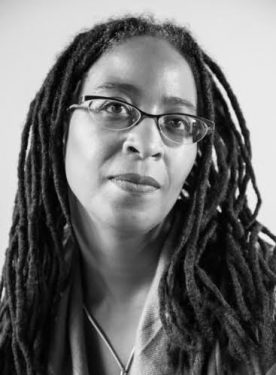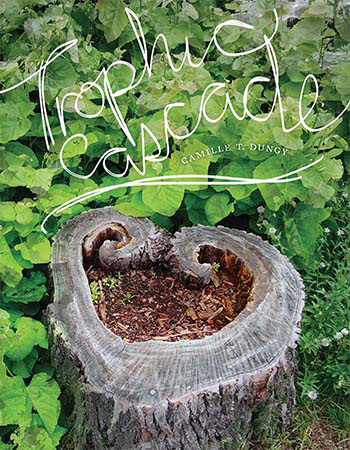Story by Jeff Dodge. Originally published on SOURCE.

Each week, Pulitzer Prize-winner and former U.S. Poet Laureate Rita Dove selects a single poem to feature in the Sunday issue of the New York Times Magazine.
For the Aug. 12 edition, the magazine’s poetry editor chose “Still Life” by Colorado State University English Professor Camille Dungy.
“It’s a big honor,” Dungy says. “It’s nice to be a poet from Colorado showing up in the New York Times Magazine. Sometimes we feel like we’re outside the hotbed of conversation on the East Coast, so it’s great to have the West represented.”
The poem, a detailed and personal snapshot from the waning life of one of Dungy’s family members, was originally published in her 2017 poetry collection Trophic Cascade. Dungy says Dove captured the essence of her poem in the editor’s introduction:
“Still life, nature morte: two names from the art world for the depiction of inanimate objects, time arrested in the image of a pear just before it tips to rot, roses plucked at the height of their blossoming. In this brutally honest portrayal of old age, Camille Dungy presents us with the paraphernalia of mounting infirmity; yet even as each object brings us closer to the end (dead nature), the refrain ‘still life’ gradually acquires another meaning — ‘not yet, still here.’ Mortality/survival: The clock ticks both ways.”
Letting it cool
Dungy recalls writing the poem shortly after the family member passed away in 2014.
“Then it sat for a while because it was a little too hot to touch,” she says.
Still life
Still life with Ensure, vials of fentanyl, oxycodone, water.
Still life with crackers maybe, hopefully, he will keep down.
Still life with tossed sheets and yogurt cup. Still life
with Sports Illustrated piles in the bathroom, guest room,
on the living room floor, on the dining room table, in recycle bins waiting
near the door. Still life with the younger brother assessing
how to dispose the hoardings of the one man left who shares his face.
Still life with hanging tension and sadness, failed ambition,
medicated dreams. Still life with phlegm and corruption.
With waste, with fanned get well cards, appointment reminders,
hospital garage parking receipts. Still life with the mantel clock,
one birthday’s present, still ticking and ticking and ticking away.
The family member used to tease Dungy about all of the “emerging writer” awards she used to win, asking, “When are you going to emerge?” But that same relative also believed in her, so she says it’s fitting that a poem about this family member was published by such a preeminent publication, in a kind of emergence.
“I would not have thought that this would be the poem that Rita Dove would pick; it feels vulnerable,” Dungy says. “But when something that’s personal to me resonates with others, it’s rewarding. That feels like the work of literature at its very best. This is my story, but others are able to read their own life in it. Yay! I’ve done my job.”
Educational lessons
In her poetry classes, Dungy says, she tells students to not be afraid of focusing on specific, personal elements of daily life.
“You don’t have to come up with some big, important, romantic adventure to draw on,” she explains. “If you write with care and attention to the lived details of your world, your world comes alive. You don’t need to have a crazy, reckless experience to have something to write about.”
The initial draft of “Still Life” sat for a couple of years before Dungy returned to it.
“The experience I describe was horrible and mundane and depressing, but also beautiful,” she says. “Recording the details of your life can hold great potential for your writing. And all of our lives are important, no matter where you are or where you’re from.”
Dungy says she’s received dozens of appreciative messages from those who were touched by her poem.
“It’s been lovely, the response I’ve gotten from people,” she says. “It’s a nice opportunity to have my work in that kind of forum.”

Other accolades
It’s just the latest in a long list of accomplishments for Dungy. Her 2017 debut prose collection of personal essays, Guidebook to Relative Strangers, was a finalist for the National Book Critics Circle Award. Trophic Cascade won the 2018 Colorado Book Award for poetry, and both of those new books are finalists for the 2018 Hurston/Wright Legacy Award. Last year, Dungy won a prestigious creative writing fellowship from the National Endowment for the Arts. Her other poetry collections are Smith Blue, finalist for the William Carlos Williams Award; Suck on the Marrow, winner of the American Book Award; and What to Eat, What to Drink, What to Leave for Poison, finalist for the PEN Center USA Literary Award for Poetry.
Her poems and essays have appeared in Best American Poetry, Best American Travel Writing, 100 Best African American Poems, nearly 30 other anthologies, plus dozens of print and online venues, including Poetry, American Poetry Review, VQR, Guernica and Poets.org.